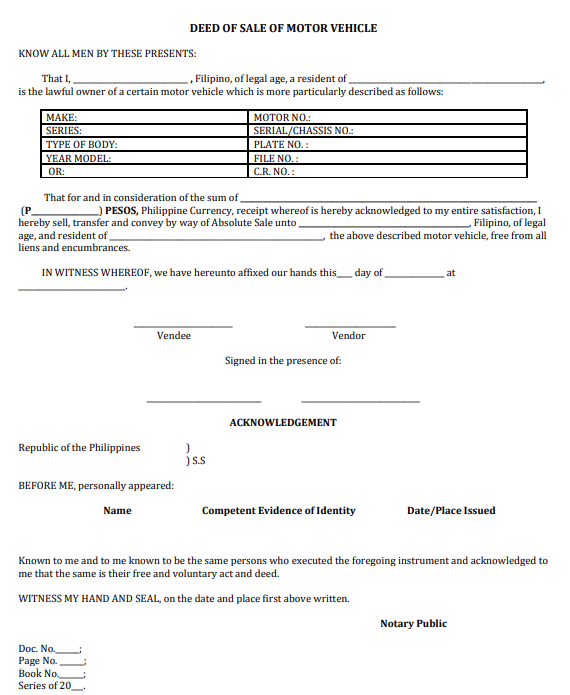A Deed of Sale for Motor Vehicles is crucial when engaging in the sale or purchase of second-hand motors. The second-hand vehicle market stands as one of the most significant sectors within the country. Individuals dealing with budget constraints and urgently needing a means of transportation favor this option.
The preference for used vehicles in such circumstances is entirely easy to understand. However, it’s important to note that buying or selling a second-hand vehicle entails specific advantages and disadvantages. Hence, it makes the use of this deed all the more essential. This guide will introduce the general overview and importance of getting this deed for vehicle sales and purchases.
Table of contents
General Idea About the Deed of Sale of a Motor Vehicle
The Deed of Sale of Motor Vehicles is among the various legal documents mandated by the Land Transportation Office (LTO). This document serves as a binding contract between the seller and the buyer. It also acts as a reference point for any potential issues that may arise concerning the vehicle in the future.
The deed will mostly require a list of needed information:
- The names of the buyer and the seller
- Residential address
- General details about the vehicle (Vehicle series, Body Type, Plate Number, Year Model, etc.)
- Certificate of vehicle’s registration number
- Date of the sale
- Warranty and representation
- Amount paid
- Acknowledgment statement
Here is a Deed of Sale of Motor Vehicle sample below:

The Deed of Sale comes in two distinct types: the regular deed of sale and the Deed of Absolute Sale of Motor Vehicle. The Deed of Absolute Sale facilitates the comprehensive transfer of vehicle ownership from the seller to the buyer without any attached conditions or encumbrances. It is crucial to identify which specific deed will be employed during the transaction process.
Also Read: GUIDE: ONLINE LTO Car Registration Renewal
How to Prepare the Deed of Sales?
In the process of selling or purchasing a second-hand vehicle, it is customary for either the seller or the buyer to create a deed of sale. Typically, the responsibility falls on the seller to draft the deed. However, the buyer can also prepare the document as a precautionary measure in case the seller does not provide the necessary paperwork.
Alternatively, both buyers and sellers can acquire a standardized template from a local Land Transportation Office (LTO) branch. During this process, the LTO representative will solicit crucial details, such as the vehicle’s specifications, condition, and the parties participating in the transaction.
After gathering the necessary information, the representative will generate the deed and furnish duplicate copies for the seller and the buyer. With the aid of the LTO, there is assurance that the deed of sale is meticulously prepared and has undergone official scrutiny.
Notarizing the Deed of Sales
Upon completing the draft of the documentation, sellers or buyers can bring their Deed of Sale of Motor Vehicle notarized at any notary public. The price of the notarial fee will also vary on the notary public’s location and preference. The notarial fee for a Deed of Sale may range between 1-2% of the property value, which solely relies upon the price of the vehicle being sold.
Why is the Deed of Sale of Motor Vehicles Important?
Having a Deed of Sale for a Motor Vehicle is essential as it serves as evidence of the vehicle’s sale. It represents the tangible agreement between the buyer and seller outlining the terms, payment, and other pertinent details.
Below are some of the advantages of having a notarized and official deed of sale:
- The agreed-upon transaction remains immutable and cannot be tampered with by either party.
- The deed stipulates that the respective party will be accountable for any matters or liabilities related to the vehicle’s performance or condition.
- The deed stands as the official documentation that comprehensively records the purchase, transfer of ownership, and the transfer of responsibilities from the seller to the buyer.
- The deed can serve as a testament and legal proof of vehicle ownership.
- The deed provides legal protection for both parties, which can prove invaluable in covering repairs or enhancements to the vehicle.
Potential Consequences
There are significant repercussions for individuals who fail to prepare a deed when buying or selling second-hand vehicles. One of the most critical issues is the lack of tangible or conclusive evidence of the vehicle’s sale or purchase without the deed.
The lack of this document not only renders the individual ineligible to claim ownership of the vehicle. It also leaves the Land Transportation Office (LTO) without a reliable reference for transferring the vehicle to the buyer’s name. Thus, it potentially results in a violation of traffic laws.
Additionally, the Deed of Sale of Motor Vehicles serves as crucial legal protection for any future repairs or enhancements. Without it, there is no binding agreement as to who is responsible for such repairs.
Also Read: GUIDE: MVUC LTO (Meaning, Computation, and more!)
Conclusion
A Deed of Sale for motor vehicles is an essential document that ensures a smooth and legally binding transfer of ownership between the seller and the buyer. After all, it provides a comprehensive record of the transaction, clearly delineates responsibilities, and safeguards the interests of both parties. To avoid potential disputes and legal complications, ensure that the deed is properly executed, witnessed, and notarized to guarantee its validity and enforceability.
Keep Reading: GUIDE: How to Check LTO Alarm



Leave a Reply